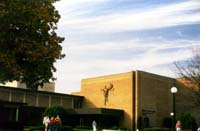Introduction
Concordia University first opened its doors as Addison Lutheran Teachers Seminary in 1864 and eventually evolved to become one of 10 universities in the country that practice the Lutheran faith. The university, located outside of Chicago in River Forest, emphasizes a combination of academics and faith as students prepare for their careers and lives after college.
A member of the Lutheran Church–Missouri Synod, this university works hard to share and live its core values: Dedication to their Lutheran faith and Christianity, belief that individuals should be celebrated, working toward and attaining excellence in every individual’s endeavors, and having the utmost integrity. Students and faculty members are also encouraged to live their faith through service to others, which is evident in the university’s mission statement:
As a distinctive, comprehensive university of The Lutheran Church–Missouri Synod, centered in the Gospel of Jesus Christ, and based in the liberal arts, Concordia University Chicago equips men and women to serve and lead with integrity, creativity, competence and compassion in a diverse, interconnected and increasingly urbanized church and world.
Students have numerous opportunities to practice their faith on campus. Worship services are held daily and students can spread the word of God as members of the Youth Ministry.
With Chicago only 10 miles away, students will find plenty to do during their free time. Chicago is a sports lover’s paradise with baseball’s White Sox and Cubs; basketball’s Bulls, football’s Bears, and hockey’s Blackhawks. Theatergoers will enjoy the Chicago Theater, the Ford Center for the Performing Arts, and Millennium Park while shoppers will find some of the world’s best shopping experiences at their fingertips. The Magnificent Mile in the heart of the city offers the very best of Chicago’s restaurants, hotels, and shops.

